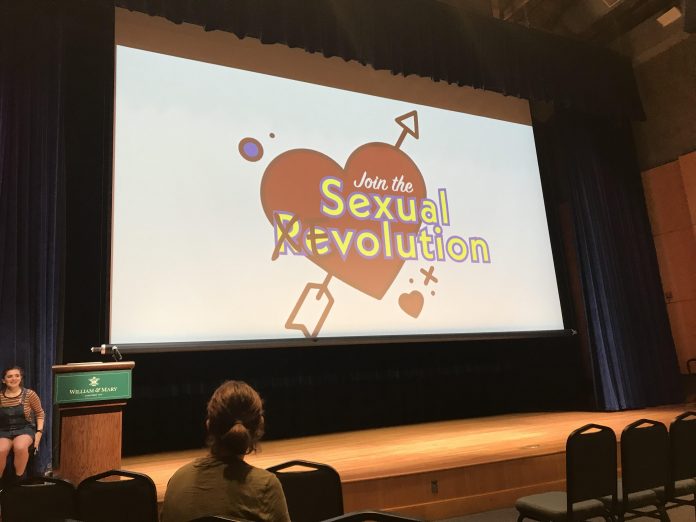
Suzi Landolphi, a frequent guest on Oprah Winfrey’s show, a condom store owner and a licensed psychotherapist, visited the College of William and Mary Oct. 1 to give a presentation entitled “Hot, Sexy, and Safer.” Landolphi, who is a mother and grandmother in addition to being an ardent HIV awareness advocate, promoted safe sex and discussed the similarities between males and females in her talk.
Landolphi explained that human embryos all develop initially as females, and illustrated to the audience that male genitalia and female genitalia possess the same basic structural components.
“We are more similar than we are different,” Landolphi said. “Tissue and nerve endings are not male and female. There is not a hard and fast line between male and female. Nature isn’t perfect and science isn’t perfect. Most of the differences that we attribute to male and female start in our stores. They are too wrapped up in the agenda of gender.”
Landolphi said that while women have been sexually oppressed for centuries, now is the time to put stigmas aside and embrace our biological similarities. In talking about safe sex and exploring one’s own sexuality, Landolphi stresses the importance of self-pleasure and masturbation.
“There has been too much myth and misinformation about how we work and how we are supposed to work,” Landolphi said.
“There has been too much myth and misinformation about how we work and how we are supposed to work,” Landolphi said. “From 1693 to today, we now know every woman and every man, regardless of the genitals that you have, that we all work the same. Those 4,000 nerve endings are there to give you pleasure and they work for you. They bring you to orgasm even with your clothes on, so you don’t have to put yourself at risk every time.”
By creating and publicizing a list of 15 things that she believes everyone needs to know before having sex with another person, Landolphi hopes that sexually transmitted infections and sexual trauma can be minimized. Landolphi said that sexual experiences can affect an individual emotionally, and that sexuality is one of the greatest gifts of being human. According to Landolphi, honest communication builds trust between sexually active individuals, and the connection it fosters ultimately improves sexual experiences.
“That’s all we are really looking for: connection,” Landolphi said. “The trouble is that we are starting to compartmentalize everything when we really know that everything works together. I remember being on Oprah and her asking me for my favorite sex tip. I say ‘Well, Oprah, everyone should be in charge of their own orgasm!’”
The lecture’s main theme was the contemporary “Sexual Revolution” that began in the 1960s, which Landolphi considers to be more of a “sexual evolution” because it refers to the process of more people becoming educated on safe sex that brings pleasure to both participants. Among the core components of modern discourse on sexuality is the belief in a gender spectrum, and that there are no definitive physical, emotional or behavioral attributes that distinguish someone as a man, a woman, gay, straight, bisexual, etc. Landolphi further stressed that every individual deserves physical, emotional, sexual and spiritual well-being.
“I don’t understand how we are going to fight for equal parity in terms of money and jobs, how are we not going to fight for this wonderful ability to make sure we create the sex life we deserve, and nothing is healthier for you than an orgasm as long as it is done in an environment where you are safe emotionally, intellectually, physically and spiritually,” Landolphi said. “When you are in an environment where you are so joyous that this is happening, that orgasm opens up all of your vascular system so it releases chemicals and endorphins and helps you sleep.”
Health Outreach Peer Educator Diversity Chair Cameron Shifflett ’20 has worked with Landolphi previously and aided her throughout the presentation. HOPE’s mission at the College is to create a safe and healthy campus, and does so by providing prevention-based peer health education.
“We sponsored the ‘Hot, Sexy, and Safer’ talk because we believed that the foci of the presentation — safer, healthier sex and relationships with others and ourselves — would further this goal by providing attendees with an opportunity to better understand how to healthfully and safely navigate both intimate encounters and relationships,” Shifflett said.
“We sponsored the ‘Hot, Sexy, and Safer’ talk because we believed that the foci of the presentation — safer, healthier sex and relationships with others and ourselves — would further this goal by providing attendees with an opportunity to better understand how to healthfully and safely navigate both intimate encounters and relationships,” Shifflett said. “We are aware that our student body’s experiences surrounding intimacy and sexual encounters vary; as a result, we also hoped the ‘Hot, Sexy and Safer’ talk would serve as a launching point for students to begin having these conversations and continue to further their education in these areas if they originally wished to expand their knowledge in these areas but didn’t quite know how or where to start.”
Abby Riemer ’22, a member of the College’s VOX chapter, attended Landolphi’s talk to learn more about safe sex and to expand her knowledge of gender and sexuality.
“I thought she did a good job of discussing gender’s biological development, but she also had a pretty heteronormative presentation that didn’t really delve into the nitty gritty details of safe sex,” Riemer said. “As a member of the LGBTQ community, I was super uncomfortable when she misgendered one of my friends as he sat on stage and again kind of upset that she told a student self-identifying as asexual that her sexuality was a choice and a result of some trauma she needed to analyze, which is very reminiscent of the idea that gay women are only gay because they’ve been abused by men. Overall, I was pretty uncomfortable at many points in the lecture and while some of that may be internalized stigmas, I also think that she didn’t do a great job of staying on topic and being informative while creating an inclusive space.”


































